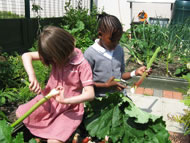ALMOST TEN YEARS ago, long before ‘organic’ became an everyday term, a pioneering organisation launched the UK’s first organic horticulture project for schools. Garden Organic (then HDRA) had been researching and promoting organic gardening, farming and food since its foundation in 1958. Its vision from the very beginning – driven by the idea that we do not inherit the Earth from our ancestors but borrow it from our children – was of nothing short of a country-wide implementation of organic growing. By the late 1990s, having broken new ground engaging the public and convincing the sceptics of such benefits, the organisation realised that the best way to achieve this vision would be to champion the organic cause through education.
So in 2000 the charity embarked on a unique project that would give children across the UK, from every social background, the opportunity to get involved in food growing, and thus the Garden Organic for Schools project was born. As issues of childhood nutrition had been hitting the headlines, the project couldn’t have been more timely.
The hands-on, practical nature of the project helps connect children with the food-growing process and the wider environment. Colette Bond, head of the project at Garden Organic, explains: “Educating children in how to grow their own organic food is a powerful way to encourage healthier eating habits as it engages children with food from the outset. Planting a seed, seeing it begin to shoot and watching it grow into something tasty and edible is a fantastic way to help children understand where food comes from, leaving them keener to eat fresh, wholesome and home-grown food.”
As well as helping children understand food provenance, the project also helps to educate them about seasonal produce and promotes a healthy appreciation of the appearance of naturally grown food before it is scrubbed and cleaned. However, without question the most vital element of the programme is the instilling of truly beneficial new skills, which help to put children in touch with the environment around them.
Since the project’s inception, schools of all kinds – from small village primaries to large urban secondaries – have signed up and successfully engaged pupils in the thrill of growing their own food by encouraging hands-on, practical participation. Many schools on the project now boast allotments and vegetable plots, raised beds and even school farms. And schools with less room to spare, like those located in the London boroughs, have taken to using innovative ideas for container growing to make the most of their space.
In recent years the project has surged in popularity, with an average of 555 schools joining each year. Indeed, in 2008, the project celebrated its proudest moment as the 5,000th school to become part of the organic growing revolution was announced as London-based Debden Park High School in Essex. The school is currently in the initial stages of setting up an organic allotment where pupils will grow and share their organic fruit and vegetables.
Bond says, “Seeing the project reach 5,000 schools was a significant achievement as it reflects how attitudes to food growing have changed. Increasingly schools and the wider public are recognising that the skills needed to grow our own food are well worth acquiring, and can lead to fulfilling and sustainable jobs and lifestyles.”
Thanks to both the success of its educational project and its horticultural expertise, in 2007 Garden Organic succeeded in becoming a key player in the Food for Life Partnership. This groundbreaking partnership, which aims to transform school food culture in England, revolves around giving children the chance to shape their food education in everything from food growing to cooking, with improving school meals at the heart of the Partnership’s work. Garden Organic’s role is to provide the ‘grow it’ element.
With over 15% of all UK schools now signed up to Garden Organic for Schools, the organisation has set in motion an ongoing cycle that will enable adults of the future to understand more about food provenance, nutrition, sustainability and growing than their parents ever did. And this is what Garden Organic for Schools is about; giving children the opportunity to assert their food citizenship. By providing first-hand experience of growing and gardening, the chance to get outdoors and enjoy Nature, the decade-long project has equipped children with the skills needed to take the future of food into their own hands.
For more information visit www.gardenorganic.org.uk or call 024 7630 3517.
All Garden Organic for Schools members receive practical growing advice, seeds, curriculum-based resources, activity sheets and quarterly newsletters, and those based in England are automatically invited to take part in the Food for Life Partnership.
Charlotte Corner is Senior Media Relations Officer at Garden Organic.








